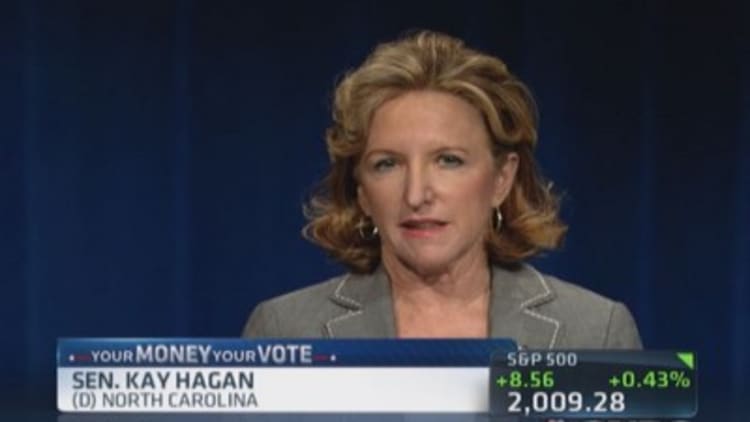
RALEIGH, N.C.—The first of three North Carolina Senate debates offered a clear view of the messages and mobilization strategies Republicans and Democrats will use across the nation this fall.
State House Speaker Thom Tillis, the Republican candidate, tied Democratic incumbent Kay Hagan to an unpopular President Barack Obama. The new health law known as "Obamacare" was part of that attack, but only a part—which reflects the law's improved recent implementation after opening stumbles last fall.
The result: Over and over, the speaker derided Hagan as a "rubber stamp" who had backed Obama "95 percent of the time." He criticized Obama's foreign policy as weak, offered words of comfort for police over recent events in Ferguson, Missouri, criticized "amnesty" for illegal immigrants and defended the Supreme Court's recent Hobby Lobby decision on contraception as protecting "religious freedom."
That approach fits the Republican coalition in North Carolina and elsewhere, heavy with tradition-minded conservatives, whites, older voters and men.
Read MoreWhat's at stake in a NC Senate debate? Plenty
Hagan's approach reflected her target coalition, heavy with Latinos, African-Americans, young voters and single women. She called for congressional action on immigration (though not unilateral action by Obama), criticized the militarization of local police forces as shown by the Ferguson violence and hit Tillis for state education cuts. Over and over, she accused Tillis of failing to "understand the needs of women" on issues such as contraception and equal pay.
Those themes fit the national messages that strategists in both parties have prescribed as they attempt to limit the traditional drop-off in turnout levels for key voters from presidential to midterm elections. Both sides are less certain how to handle rapidly shifting cross currents on foreign policy, which pit public weariness with wars overseas against rising anger over the brutality of Islamic extremists in Iraq and Syria.
Read MoreVacation barbs the least of Obama's issues as he returns to DC
That uncertainty was also reflected in Wednesday night's North Carolina debate. Hagan joined Tillis in slamming Obama's failure to prevent extremists from gaining strength. But both stopped short of calling for U.S. military action in Syria, the same issue vexing the Obama administration at the moment.
—By CNBC's John Harwood


